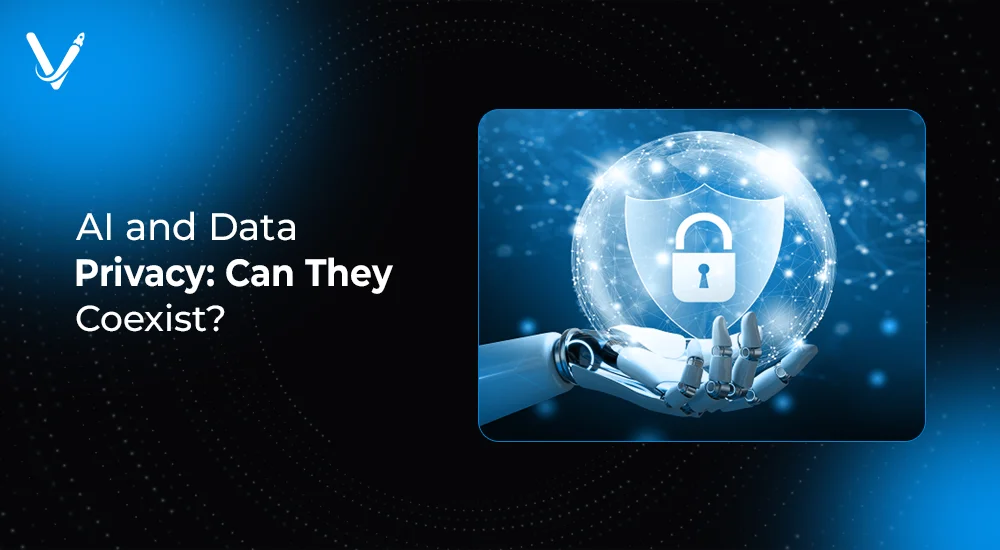AI and Data Privacy: Can They Coexist?


- Jun 18, 2025
Artificial Intelligence is redefining how we live, work, shop, and communicate. It powers everything from personalized healthcare to fraud detection and predictive search. But there's a looming question that refuses to fade: Can AI and data privacy truly coexist? As AI systems grow more intelligent, so does their appetite for data. That raises crucial concerns around surveillance, consent, security, and ethical responsibility.
In a digital world built on data, balancing innovation with individual rights has become one of the defining challenges of the decade. This article explores how artificial intelligence can evolve responsibly without eroding personal privacy. It covers real-world examples, current regulations, emerging technologies, and actionable strategies businesses can adopt to protect user data while building powerful AI systems.
AI thrives on data. The more high-quality information it has access to, the better its predictions, classifications, and decisions. But most of that data originates from humans—browsing habits, purchase history, biometric details, voice patterns, even emotional responses.
This dependency creates a privacy paradox: AI needs personal data to learn, yet using that data can violate user trust or even legal boundaries.
Real-world incidents provide a sobering reminder of how easily data privacy can be compromised in the name of AI advancement.
In one of the most notorious breaches of data trust, Cambridge Analytica harvested personal Facebook data from over 87 million users without consent to build psychographic profiles. These profiles were then used to influence political campaigns. This case highlighted the dangers of opaque AI targeting algorithms combined with weak data controls.
Clearview AI scraped billions of facial images from social media without user consent to build a facial recognition database. It was used by law enforcement agencies globally, sparking lawsuits and bans. The public backlash underscored concerns about mass surveillance and biometric privacy in AI applications.
In 2019, Google’s partnership with Ascension gave the tech giant access to health records of millions of Americans. While Google claimed it was building better AI tools for doctors, the deal was signed without patient knowledge. This raised alarms about HIPAA compliance and informed consent in AI-assisted healthcare.
Global governments have started to respond to the privacy risks posed by AI. Regulatory bodies are creating stricter frameworks to guide ethical and lawful AI use.
The European Union’s GDPR remains the gold standard in data privacy. It mandates:
Under GDPR, AI companies must explain their data practices and justify algorithmic decisions that affect users.
CCPA gives Californians control over how their data is collected and sold. Companies must disclose their data practices and provide opt-out options.
India’s upcoming framework focuses on protecting personal data, especially as AI applications grow in finance, healthcare, and education. It emphasizes accountability, data localization, and lawful processing.
This new regulation categorizes AI systems by risk level—banning some, regulating others, and encouraging innovation in low-risk areas. It may become the world's first comprehensive AI law.
Key takeaway: AI systems in 2025 are not just governed by engineering—they're also subject to legal scrutiny. Companies that fail to adapt will face fines, reputational damage, or both.
Yes, but it requires rethinking how we build, train, and deploy AI models. A privacy-first AI approach respects user autonomy and integrates protection into the core architecture.
Several new technologies are emerging to ensure that AI models can still perform well without exposing personal data.
Instead of sending user data to a central server, federated learning trains AI models locally on devices. The model is then updated using aggregated insights—never raw data.
Example: Google uses federated learning in Gboard to improve predictive text without uploading your typing history.
This technique injects mathematical noise into datasets, masking individual data points while preserving overall patterns.
Use case: Apple and the U.S. Census Bureau use differential privacy to release useful data without compromising individual identities.
Homomorphic encryption allows data to be processed in encrypted form. The AI can make predictions without ever seeing the raw data.
Benefit: Reduces risks in AI applications involving health records, financial data, or national security.
AI can generate synthetic datasets that mimic real-world patterns without using actual user data.
Benefit: It trains models while avoiding real privacy exposure, especially useful in medical or financial sectors.
Data privacy is no longer just a compliance checkbox—it’s a competitive differentiator. Users are more aware and selective about who they trust.
Stat insight: According to a Cisco survey, 92% of users say they care about how their data is used, and 87% say they wouldn’t do business with a company they didn’t trust.
Organizations must take proactive steps to align their AI systems with privacy best practices.
Evaluate what data you collect, where it’s stored, how it’s used, and who has access. Eliminate unnecessary data collection.
Integrate privacy considerations into the model development lifecycle—not as an afterthought, but as a design principle.
Incorporate federated learning, encryption, or synthetic data generation in your AI workflows.
Audit your datasets for bias, consent, and relevance. Use only lawful and ethical data sources.
Use plain language policies and real-time notifications when user data is accessed or processed.
The next frontier in AI is contextual intelligence—systems that not only protect privacy but also understand user boundaries.
Imagine a virtual assistant that:
This kind of value-sensitive design is what will define the future of AI systems that coexist with data privacy.
Companies that embrace this approach will enjoy deeper user trust, fewer compliance hurdles, and a stronger brand reputation.
AI and data privacy are not enemies—they are two sides of the same innovation coin. With the right strategies, tools, and mindset, it's possible to create intelligent systems that serve human needs while safeguarding human rights.
As consumers grow more privacy-aware and regulations get stricter, the responsibility lies with developers, product teams, and businesses to build AI that’s not just smart—but also safe, transparent, and trustworthy.
At Vasundhara Infotech, we specialize in developing AI solutions that are ethical, scalable, and privacy-first. Contact us today to build responsible AI tools that drive impact without compromising integrity.
Copyright © 2026 Vasundhara Infotech. All Rights Reserved.
